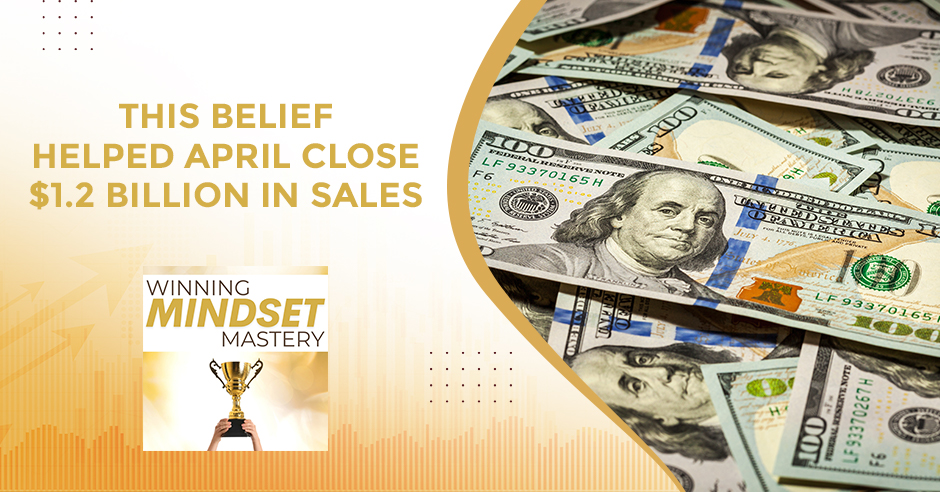
Ditch the “problem creation” game in sales and get ready to uncover the controversial belief that propelled one sales superstar to close a whopping $1.2 billion in sales and dominate the industry! This episode flips the script on traditional tactics. April Shprintz reveals the secret to success: helping those who already know they need help. Learn why spending time convincing someone they have a problem is a waste of energy, and how to identify prospects ready to take action for faster sales cycles and happier clients. Tune in and discover a more efficient, relation-building approach to sales that gets results!
—
Listen to the podcast here
This Belief Helped April Close $1.2 Billion in Sales
Controversial Belief
I am so glad you’re here. Many people have asked me how I got to the place where I could close $1.2 billion in sales and how I was the top salesperson in multiple companies or at least in the top 1% of salespeople if I wasn’t the top salesperson the entire time. There are lots of contributing factors to being very successful in sales. All of which I believe are based on truly wanting to help people. If I had to narrow it down to one thing, one belief that made it possible for me to do all these things. It is a belief that is pretty controversial and lots of other people might not share.
I will tell you, it was the belief that I am not, nor have I ever been in the business of educating people into believing they had a problem. Here’s what I mean. When you’re looking for a solution to buy something, whether it’s from an entrepreneur or a company or a very complex sale. Whether you’re looking for equipment or processes or consulting or helping, it doesn’t matter. What gets you there is knowing that you have a problem that you need to solve for.
That is table stakes. Knowing that exists. When you think of a sales funnel and the different people that you’ll encounter when you’re selling, you will encounter people who are at the very top who they don’t know who you are or what you can do and how you can help them. You know people that are a little more in the middle of that funnel from an awareness perspective. They may know who you are, but they don’t know that you or your company are exactly what they need to be helped.
You’ve got the folks in the very bottom who know who you are, what you have, and are waiting for the opportunity to buy from you. I think of that as the full sales funnel. You’ll notice I did not include the people who don’t know who you are and don’t know they need you. One of the things that we can waste a lot of time on from a sales perspective is trying to convince somebody that they need a product or service when they’re not there yet. That doesn’t serve us because it’s not the best use of our time.
It doesn’t serve them because they aren’t at the point yet where they are ready to take action, and you’ve got to experience enough of what you don’t want or the pain or the hassle or the frustration to be willing to make a move because change is scary. Regardless of what you’re selling, you’re selling change. Changing from what they’re doing now or doing nothing to whatever the solution or offering or product or services.
Spend Your Time Wisely
For me, I always found out very quickly if someone understood that they had a problem they needed to solve. If they didn’t, I walked away. Again, this can be a little controversial. It certainly was incorporated because they’d be like, “Why aren’t you working that lead? Why aren’t you following up with these folks?” I would say, “They don’t know they need us.” My leadership would often say, “That’s your job to educate them on that.”
No, it isn’t because I will spend more time trying to convince them that they have a problem than it would take me to convince five other companies, people, or contacts that I can help them with the problem they’ve already identified. It is a much better use of time. A lot of times when you’re early on and selling and someone else is telling you that you have to hit a quota.
You don’t want to let go of those potential leads just because they don’t seem to know that they have an issue. I promise you, deciding that they are not in a place yet for you to help them or even better, deciding together and letting them educate you on the fact that they think it’s okay. Parting as friends does two things. One, it does free up your time and allows you to be a much better and much more helpful salesperson to anyone else that you work with.
Number two, it allows you to give them a nudge about a different way that they could run their business and have their life be, but you’re not pushing them towards it. You’re accepting their, “No, I’m good,” and they can then come back to you later. If you need to hear this in a different way, think about a family member who might be inspired by the fact that you’re very much into fitness, but isn’t it a point where they want to make a change in their life?
You can absolutely alienate that family member by telling them that you think they’re going to die of heart disease. They’ve put on a ton of weight, and they’re not moving like they used to. If they would just recognize this, you could help them and get them fit, or you can thank them for the compliment. Tell them that if they’re ever interested in knowing more about the lifestyle that you have, you’d be happy to help them and simply go about your day, which in the sales cycle would look like parting as friends.
Adopting the belief that you are not in the business of educating anybody, that they have a problem, saves you time. Keeps you in a better place with a lot of relationships when people aren’t ready to make that move yet, and will help you be a far better salesperson than you would ever be trying to convince people that they have a problem and need what you have to solve it. Here’s to your success.
You are not in the business of educating anybody that they have a problem Share on X





